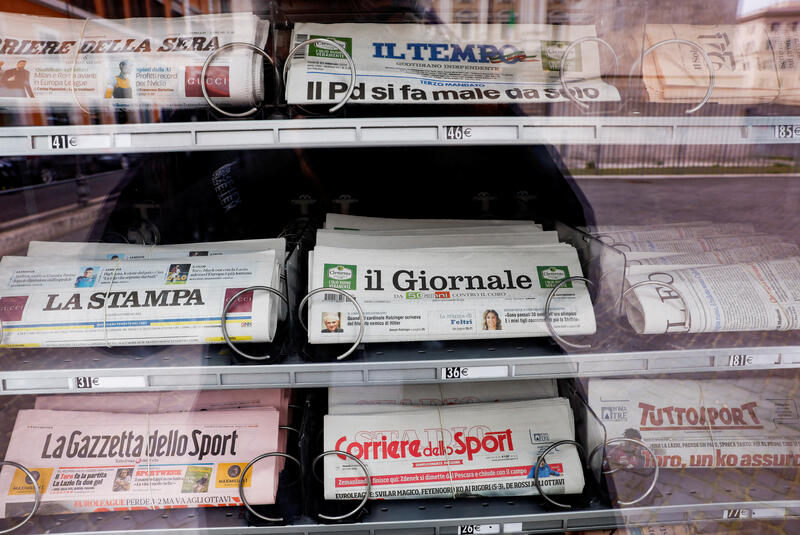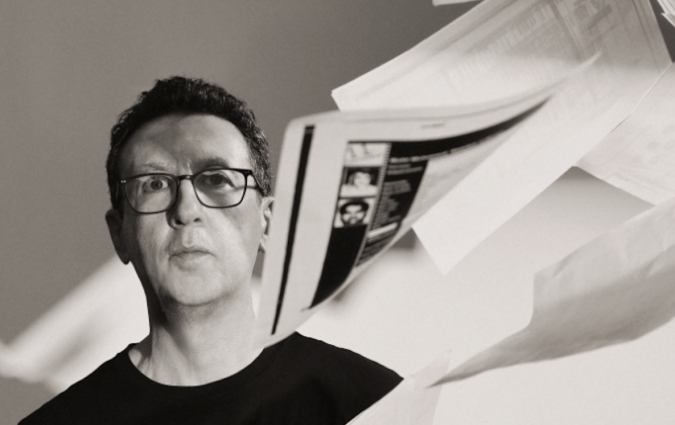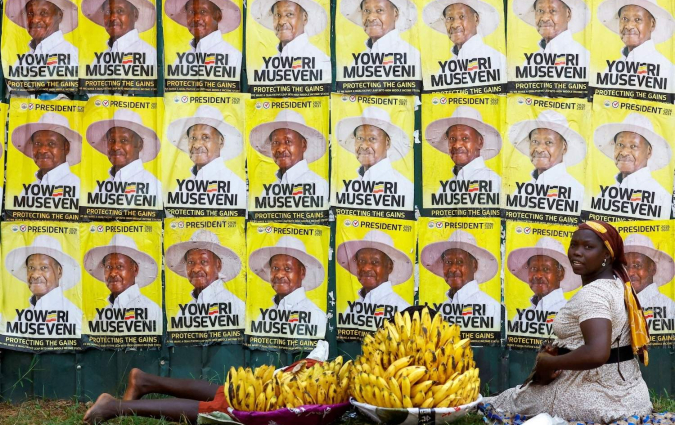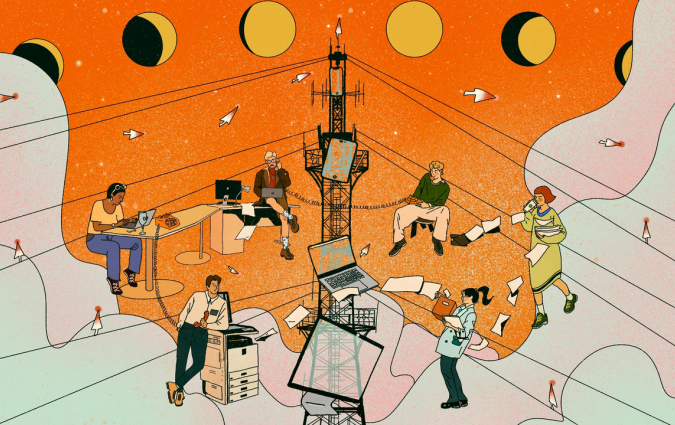Under a far-right government, journalists fear press freedom in Italy is heading down a slippery slope

An Italian newspaper vending machine stands inside a kiosk. | REUTERS/Remo Casilli
In the lead-up to Italy’s Liberation Day on 25 April, award-winning writer Antonio Scurati, the author of a documentary novel about Mussolini and the rise of fascism, was preparing to read a TV monologue to mark the anniversary of the end of Nazi occupation in 1945. But his scheduled appearance on the Italian public broadcaster RAI would not take place: at the last minute, it was cancelled.
The reasons were unclear. RAI executives said it was due to an economic disagreement. Serena Bortone, who presents the programme Scurati had been invited to, posted on Instagram that she “was unable to obtain a plausible explanation” and the writer himself strongly denied the claim. Bortone read out the planned monologue on air alone. The text was very critical of Prime Minister Giorgia Meloni, recalling her party’s neofascist roots.
An internal RAI note published by Repubblica newspaper pointed out that the contract was cancelled for “editorial reasons”. RAI and the government denied accusations of censorship, and Meloni even posted the text of the monologue on her official Facebook profile. But RAI suspended Bortone for six days following her social media post for breaching the broadcaster’s confidentiality agreement.
What has become known as the ‘Scurati case’ sparked fresh concerns about the decline of press freedom in Italy. Some Italian journalists had been raising the alarm for months. But the issue became more widely known in July with the publication of two reports on this issue: one from the MFRR media freedom watchdog and the European Commission’s yearly Rule of Law Report, a document that analyses the state of media freedoms and checks and balances in each member state.
Both reports highlighted concerns about media ownership and legal threats to journalists and criticised the governance system of the Italian public service broadcaster RAI.
According to this year’s Press Freedom Index by Reporters Without Borders (RSF), published in May, Italy ranks 46th out of 180 countries in 2023. This is a five-place drop from the year before. But it’s important to stress that the country still has a diverse media environment and is relatively safe for journalists. No reporters were killed or jailed so far this year.
And yet there are signs of a potential drift towards democratic backsliding, spurred on by important government actions which could create a less pluralistic future for Italian media. I spoke to Francesca De Benedetti, a journalist for the progressive newspaper Domani, Gianni Riotta, an experienced Italian journalist and academic, and Renate Schroeder, Director of the European Federation of Journalists (EFJ) to learn more about the state of press freedom in the country and to discuss what may come next.
Who rules over RAI?
RAI is one of the largest public broadcasters in Europe and plays an important role in the identity of a country where television is still a significant source of news. Founded in 1924, it employs over 12,000 people and includes 21 TV stations, 16 radio stations and several digital channels.
According to our Digital News Report 2024, RAI’s TV channels are still the most popular offline source of news in the country. The broadcaster also ranks as the sixth most popular online source. It is trusted by 58% of Italians and distrusted by 20%. In Italy, TV is the second-most popular source of news, closely behind online sources. Further analysis by our partners published in the Digital News Report Italia found that the majority of Italians who identify as politically centre-right or right-wing use TV as their main source of news, and that people who self-identify as centrists are more likely to trust RAI than people on either end of the political spectrum.
As the MFRR report explains, the broadcaster has always been controlled by political parties to some extent. The ruling parties already had considerable influence in choosing RAI’s board before Meloni was in power. However, her appointments to the broadcaster have been called out by trade unions as an “unprecedented occupation of the public service.” Union leader Vittorio di Trapani emphasised the “unprecedented … manner and scale” of this, pointing to the mid-mandate replacement of RAI’s CEO and subsequently of most of the broadcaster’s editors-in-chief.
RAI’s CEO Carlo Fuortes resigned in May 2023, before his mandate expired, citing a “political clash” and stressing he could not accept editorial changes and “a programming that I do not consider to be in RAI’s interest.” He was replaced by Roberto Sergio, previously director of RAI Radio. Then on 1 October 2024, when a new board of directors was announced, Sergio swapped jobs with RAI director general Giampaolo Rossi, who took on the role of CEO with the support of Meloni’s party Fratelli d’Italia.
“An unprecedented intrusion”
“The Italian far right has always thought that mainstream media hold a negative opinion of those who come from neo-fascist groups,” said Gianni Riotta, a former editor-in-chief of the financial newspaper Il Sole 24 Ore and RAI news program TG1.
Riotta is now a writer for La Stampa while holding several academic roles. He said this was the attitude of the Italian Social Movement (MSI), a neofascist political party active in Italy in the latter half of the 20th century, and is also true for Fratelli d’Italia (FdI), its natural successor and the party of Prime Minister Meloni.
“Right-wing media dream of overturning the supposed ‘cultural hegemony of the left,’” Riotta said. “But this is an old myth in a country that was governed for half a century by the [centrist, Catholic] Democrazia Cristiana and for 20 years by Silvio Berlusconi. Italy is a moderate country, not a left-wing one.”
"The departure of talented professionals from RAI,” Riotta added, “is not a positive thing."
“There has never been such unprecedented intrusion into editorial policy,” Renate Schroeder, Director of the European Federation of Journalists (EFJ) said of the Scurati case.
The EFJ is one of the MFRR partners and Schroeder was part of the mission that the group sent to Italy. Originally, it was a routine visit scheduled for October but was pushed forward at the behest of two Italian journalists’ unions. They formally met with 36 people, including institutional representatives, union leaders and journalists.
The MFRR report also refers to the 2023 cancellation of a programme hosted by journalist and author Roberto Saviano following a complaint by centre-right party Forza Italia. Saviano called Meloni’s deputy Matteo Salvini ‘minister of the underworld’. The programme was eventually reinstated and is currently being broadcast on one of the RAI channels.
Using the courts against journalists
One of the points of concern brought up in the reports recently published was the use of legal intimidation against journalists. Almost one-third of the 141 media freedom alerts recorded by MFRR in Italy last year focused on legal incidents, ranging from complaints to convictions.
Defamation is a criminal offence in the country. A 1948 law made it punishable by a prison sentence of up to six years if committed through print, with this later extended to radio, television and the Internet. Italy’s Constitutional Court declared prison sentences for this crime unconstitutional in 2021, except for exceptional cases.
Some of these lawsuits involve members of the current government. In the most recent case recorded, far-right minister Giovanbattista Fazzolari announced he would file a complaint about the progressive newspaper Domani for an article on his connection with a lobbying company.
Fazzolari’s complaint was not his first run-in with Domani: he had already filed a lawsuit against the newspaper in February. Both Economy Minister Giancarlo Giorgetti and Undersecretary of Labour Claudio Durigon had threatened to sue Domani too.
A newspaper is targeted
Similar complaints have been filed against progressive magazine L'Espresso and RAI’s investigative programme Report. However, Domani has repeatedly been threatened with legal action. Meloni even launched a defamation lawsuit against its editors, Stefano Feltri and Emiliano Fittipaldi.
The newspaper’s legal troubles began in October 2021, when Meloni filed a lawsuit concerning an article suggesting she had helped a friend win government contracts during the pandemic. At that time, she was a member of the Italian parliament but not yet the Prime Minister and her party were in the minority. Meloni came to power in October 2022 and only dropped the lawsuit in July 2024.
Domani was launched in 2020 by a former Repubblica publisher and often touches on “some themes that can be described as progressive such as climate and inequality,” said Francesca De Benedetti, a senior editor at the newspaper and a fellow at the Institute for Human Sciences (IWM) in Vienna.
The initial idea was to be an online-only newspaper, but De Benedetti explained that a print version was required to reach older demographics. Nevertheless, the business model focuses on online subscriptions.
De Benedetti highlights the role of Domani’s investigative team, including Fittipaldi and experienced reporters Giovanni Tizian and Stefano Vergine. “We are at the centre of the government’s attention because these are some of the most important investigative journalists in the country,” she said. The team has been involved in investigations around impactful stories such as a well-known missing person case, topics relating to organised crime and extremist groups as well as political issues like alleged links between the right-wing party Lega and Russia.
The lawsuit launched by Undersecretary Durigon led to the police visiting Domani’s newsroom in March 2023 to confiscate an article authored by two members of the paper’s investigative team. The piece, available online but behind a paywall, was the subject of Durigon’s criminal defamation complaint but appeared not to have been attached to the suit, prompting the police’s visit to the newsroom. This case attracted significant attention at the European level: it was called out via a statement by MFRR, via a question to the European Commission by Dutch Member of the European Parliament Sophia in 't Veld, and covered in the influential Politico Brussels Playbook newsletter. Two weeks after the police officers’ visit, the Rome prosecutor’s office annulled the confiscation order.
It’s not just government members filing complaints against newspapers. There have been cases of large corporations doing the same. For example, in 2021 Italian multinational energy company ENI demanded Domani pay it €100,000 or it would file a defamation suit over an article. Large companies have always had a strong influence in the Italian media industry as advertisers and often even as shareholders of the country's media groups.
The government’s response
Members of the ruling coalition declined to meet with the MFRR delegation during their mission to Italy this year.
“Our idea had been to talk to the government about these things and have a constructive dialogue,” said Schroeder. “We met with some people from the opposition. We also met with [Senator Barbara Floridia, President of the RAI Oversight Parliamentary Committee], but we did not meet anybody from the ruling party.” The representatives contacted by MFRR either did not reply or said they didn’t have time to meet.
The government did not respond to a request for comment I sent while reporting on this piece.
In response to the Rule of Law Report, Italian Prime Minister Giorgia Meloni penned a letter to the European Commission President, Ursula von der Leyen. She said some of the points on press freedom had been “distorted for political purposes.”
When the MFRR report was published, some right-leaning newspapers referred to its sources as “anti-Meloni journalists” who “painted Italy as an authoritarian country.”
In response to journalists’ questions, Meloni said the critical aspects of the Commission’s report had come from “stakeholders” rather than from the Commission itself, and named left-leaning newspapers Domani, Il Fatto Quotidiano and Repubblica as some of these sources. Her words further alarmed some journalists and press freedom advocates.
Schroeder strongly denies suggestions of left-wing bias in the MFRR report. She points to MFRR’s monitoring system and stresses the document was based on evidence, not ideology.
“We do very serious monitoring, with different parties involved,” she said, emphasising MFRR’s focus on collecting facts.
Some journalists in Italy also face other forms of intimidation, such as physical attacks, threats and verbal harassment, often from extremist groups or organised crime, with some high-profile journalists, including Roberto Saviano, under police protection after receiving threats for their reporting.
De Benedetti worries the discrediting of her investigative colleagues, some of whom have been under police protection, could further endanger them.
“It’s a very risky situation,” she said. “We are being described as aggressors, as enemies of Meloni and enemies of the country. In reality, we are the victims of these attacks.”
Many of the journalists whose experiences informed the MFRR report, including De Benedetti, have been targeted online. She has been chronicling Domani’s run-ins with the government on her X account, posting threads about some of the incidents, sometimes in English, and authoring articles about them for her newspaper and other publications. De Benedetti has received “violent and sexist messages” and she’s concerned about the way this government hostility is discrediting journalists and their work.
How bad is it?
Asked about whether the current situation could escalate into a broader attack on media freedom, Riotta identifies a general weakening of the information ecosystem rather than a calculated plan.
“I don't believe in a hidden plan or agenda, but in the growing weakness of mainstream media, and the spread of online disinformation,” he said. “When clichés about Russia, the pandemic, the economy, and Ukraine are repeatedly echoed by the government, the result is serious.”
“The Italian press has a limited tradition of fairness and impartiality,” Riotta added. “It operates in a partisan, biassed manner, and social media, both on the right and left, have fuelled this tendency to the point of absurdity.”
According to survey data from our Digital News Report 2022, only 13% of Italians think that the news media are independent from undue influence from government and politics, one of the lowest percentages of the countries covered by our report.
While he doesn’t believe it’s overly alarmist to be worried about the future of press freedom in Italy, Riotta also highlights the enduring power of mainstream media in holding ministers to account. He points to the example of the recent scandal involving Gennaro Sangiuliano, former Minister of Culture.
Sangiuliano was facing scrutiny over claims made online by a social media influencer who said she had been appointed as an advisor to the ministry. After the Ministry of Culture denied this, she said she had been granted access to ministry trips and documents. During a tense TV interview on RAI’s first channel, Sangiuliano admitted to an affair with the woman and resigned days later.
"Worrying is useful, but look at the case of Minister Sangiuliano: a massive interview on TG1, a record 15 minutes, and the schedule turned upside down for him, yet it didn’t save him," Riotta said.
When asked about the future of journalism in Italy, though, Riotta said he views it as “bleak, like everywhere,” partly due to Italian media’s slowness to innovate.
Despite some examples of successful digital-first news outlets like Il Post and Fanpage.it, a lot of newsrooms have been slow to move to digital, and some legacy newspapers still have a team producing content for online editions separately from the rest of the newsroom.
"In Italy, we started late with web journalism, data journalism, and now AI. It’s not a matter of right or left, but a cultural, anti-tech Luddite flaw. In fact, when it comes to AI, both the right and left are stuck in the past," Riotta said.
New European legislation
The European Media Freedom Act (EMFA), a piece of legislation which entered into force in May in every country of the European Union, could change things in Italy too.
The MFRR report argues that the rules regulating RAI are ‘fundamentally contrary’ to this law, as one of its aims is to ensure the independent functioning of public service media. Member states have until August 2025 to enforce the new rules.
Concerning the Rule of Law Report, the next steps for the European Commission in the so-called Rule of Law mechanism are monitoring Italy’s response to its recommendations, and continuing dialogue. In cases of persistent noncompliance, the Commission can launch infringement procedures. Article 7 of the EU Treaty would allow the EU to first apply preventative measures and, in very severe cases, sanctions against the country.
“For us, it’s very important to get the EMFA adopted and change the law. If not, we hope that the European Commission will use its enforcement capacity,” Schroeder said. “It's very difficult for Italy to do it alone. We really need the European Commission. We need the rule of law mechanism to be taken seriously.”
It’s not only Italy that is in this position. Schroeder and her colleagues are seeing similar patterns across Europe.
In September, MFRR conducted an online fact-finding mission in Croatia, which is also encountering press freedom issues, including the independence of its media authority, transparency in media ownership and the implementation of laws to protect press freedom, Schroeder said. Greece and Slovakia are also on a similar path. Schroeder concluded: “We have problems in many countries. There's a lot to do.”
In every email we send you'll find original reporting, evidence-based insights, online seminars and readings curated from 100s of sources - all in 5 minutes.
- Twice a week
- More than 20,000 people receive it
- Unsubscribe any time
signup block
In every email we send you'll find original reporting, evidence-based insights, online seminars and readings curated from 100s of sources - all in 5 minutes.
- Twice a week
- More than 20,000 people receive it
- Unsubscribe any time





